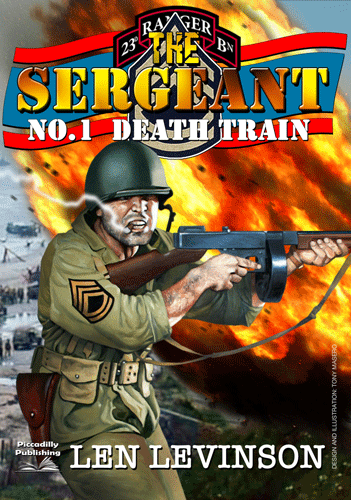The second volume in
The Sergeant series finds Master Sergeant C.J. Mahoney and his loyal sidekick, Corporal Cranepool, attempting to make it to the Allied lines, three days after the events of the first book. Mahoney, wounded in the leg by a German bullet, decides to hijack a German motorcycle with sidecar, since Cranepool is familiar with motorcycles and claims he can operate one. What follows is a crazed, full-throttle ride through the enemy lines, zipping through the contested town of Carentan, and then through no-man's land and finally into the Allied lines. This is definitely an action-packed opening to the book, with Cranepool dodging artillery, mortar fire, and machine gun bullets, as well as jumping trenches, foxholes, and craters. Eventually the pair find themselves back inside the Allied lines, and once their bona fides are cleared (they're dressed in the German uniforms they "borrowed" from the motorcycle's previous crew), Mahoney is sent back to England to have his leg wound treated, while Cranepool returns to his Ranger battalion. A pretty solid start to the second book in this series.
At this point, things slow down a lot, and we spend the next fifty pages with Mahoney, as he recuperates back in London. Mahoney spends these chapters grumbling and grousing in the hospital, eventually sneaking out while wearing a stolen Captain's uniform with $1,800 in his pocket, earned from gambling with other patients. Mahoney is going to find a whorehouse and get himself laid, reasoning that he'll be sent to the front lines soon, where he'll not be able to chase any tail. Although I thought this was going to be an extremely dull section of the book, Levinson is able to make it almost poignant; Mahoney's wooing of a young American nurse comes off as heavy-handed and corny at times, but their reflections on the way the war torments everyone's emotions, not knowing from one minute to the next whether you'll live or die, even as far behind the lines as London, means people's priorities become seriously confused. Although Shirley - the nurse in question - has a fiance who is a Navy pilot in the Pacific, she has no idea whether he's alive or dead, and whether he is faithful or not. This all leads to several pages of raunchy sex, of course, but the character interaction plays out better than you'd expect.
Eventually Mahoney is returned to his unit, and he and Cranepool are reunited just in time to go and take out a German pillbox. This attack is an appetizer for the battles to come in later books, and showcases Levinson's ability to effectively show us the chaos and insanity of frontline combat. Guys have their faces shot off, get blown to pieces, cooked to death in the bellies of dying tanks, and killed in brutal hand-to-hand fighting. We also see that, although Mahoney and Cranepool were effective behind-the-lines soldiers, they really come into their own in a straight-up fight.
Finally, after a day's hard fighting, Mahoney is called back to HQ and given another behind-enemy lines mission (
wah wah wahhhhhh); he is to sneak into the French city of Cherbourg and destroy the mechanism by which the Germans can detonate a huge number of jury-rigged torpedoes and other explosives, placed to utterly annihilate the city's harbor. Since the harbor is going to be one of the Allies' main pipelines of troops and supplies once the city is inevitably taken, losing the ability to use the harbor will be disastrous for future plans to push into France. As the back cover states, "
If the Sergeant doesn't save the harbor, the Allied armies strangle to death...". I won't give away the rest of the plot, but Levinson has Mahoney, Cranepool, their Captain, and a number of other Rangers sneak into Cherbourg and meet up with the Resistance to carry out their mission.
To some degree in
Death Train, but even more so in
Hell's Harbor, Levinson cuts back and forth between the main character's point of view and that of several high-ranking Germans. It is made clear to us that the
Wehrmacht generals and other officers find the orders of Hitler and his cronies to be utterly ludicrous. Time and time again they are ordered to "fight to the last man" and "not retreat one inch" against the Allied invaders. The more clear-headed officers try to argue that standing firm and losing men in unwinnable battles does nothing but waste resources of men and material that the Germans can't afford to replace, while the Aliies land more men and supplies all the time. On many occasions I found myself gritting my teeth and cursing Hitler and his cronies for their stupidity, and actually rooting for the beleaguered
Wehrmacht officers, several of whom are just waiting for the time to be right so they can peaceably surrender to the Allies, fearing only that this will be discovered and cause their families back home to suffer the wrath of the SS. Levinson does a great job of showing us that not only did Hitler carry out an insane and atrocious war, but he allowed it to go on far past the point when it was clearly obvious to any sane person with an understanding of the realities of strategic warfare that the Germans could not help but lose.
All in all, a fun, fast read. As I type this, I'm about 50 pages into book #3,
Bloody Bush, and enjoying it immensely.







